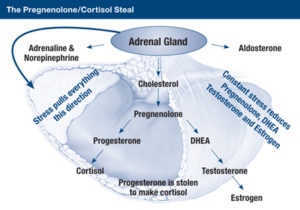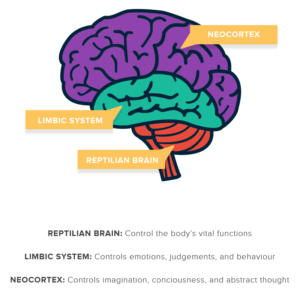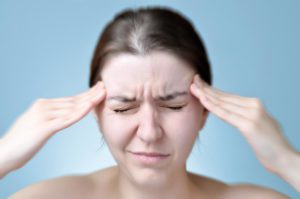
Hormones are special chemical messengers in the body that are created in the endocrine glands. These messengers control most major bodily functions, from simple basic needs like hunger to complex systems like reproduction, and even emotions and mood.
When our hormones are working in harmony, we have balance in the body and we thrive. But small problems with hormones can cause serious and life-altering symptoms.
When women, in particular, have hormone imbalances, it’s utter mayhem, to say the least. Symptoms are many and for the woman, it’s a rollercoaster of dis-ease that she would much rather get off.
So let’s explore the types of hormones and the common hormonal imbalance symptoms seen in women.
Major Types of Hormones
The body has many different hormones, but certain types have a bigger role to play in the body’s health and well-being. Understanding these roles is important for those looking to protect and manage their health.
For women, oestrogen is the main sex hormone. It causes puberty, prepares the body and uterus for pregnancy, and regulates the menstrual cycle. During menopause, oestrogen level changes cause many of the uncomfortable symptoms women experience.
Progesterone is similar to oestrogen but is not considered the main sex hormone. Like oestrogen, it assists with the menstrual cycle and plays a role in pregnancy.
Cortisol has been called the “stress hormone” because of the way it assists the body in responding to stress. This is just one of several functions of this important hormone.
Melatonin levels change throughout the day, increasing after dark to trigger the responses that cause sleep.
Testosterone is an androgen, which is the main sex hormone in men, but women also have ~10%. It causes puberty, increases bone density, triggers facial hair growth, and causes muscle mass growth and strength.
Stress & Pregnenolone/Cortisol Steal
Pregnenolone is a precursor hormone. It is used by the body to make both stress and sex hormones. In times of stress, the body diverts a lot of the pregnenolone toward stress hormone production and away from sex hormone production.

This enables lots of cortisol production, but it inhibits the production of just about everything else.
Cholesterol is the mother molecule of the endocrine system. Mitochondria, controlled by the adrenals, convert cholesterol into pregnenolone. From pregnenolone, virtually all of the rest of the hormones are produced. From here, one of two things can happen: the pregnenolone can be converted to progesterone or it can be converted to DHEA. DHEA is the precursor to all of the other sex hormones, at least those produced by the adrenal system.
This means that a stressful situation will ‘steal’ all of the pregnenolone from its normal production of DHEA and shunt it into cortisol. The body will prefer this pathway to the detriment of all other adrenal pathways.
There are several complicating factors that make what could have been the reproductive system’s saving grace ultimately problematic:
First: non-dominant sex hormones (such as testosterone in a woman or oestrogen in a man) are often produced in the adrenal glands at higher levels than in the gonads. For example, the largest source of testosterone in the female body is the adrenal gland, even though a woman does produce small amounts of testosterone in her ovaries.
Second: the production of sex hormones in the adrenals is still important for the overall level of sex hormones in the body, particularly for achieving hormonal balance The adrenal glands are capable of immediately responding to hypothalamic signaling, such that when the hypothalamus gets a signal that a certain hormone is too high or too low in the bloodstream, the adrenals can make up for the difference.
Third: the pituitary still exists to send signals to the gonads. But cortisol imposes negative feedback on the HPA axis. Cortisol signals to the hypothalamus to downregulate signaling to the pituitary. So with cortisol in the system, the production of hormones in gonadal tissue decreases, too. This is the primary long-term pathway by which stress inhibits reproductive function.
Pregnenolone steal, therefore, is at face value a simple phenomenon – the body gets stressed, and it shunts hormone production into pathways that are meant to be helpful in times of need. There are levels of complications beneath this action, but in the end, it boils down to the fact that stress inhibits reproduction on a variety of fronts.
Hence, it is vital to manage our stress levels in order to balance our sex hormones.
Hormonal Imbalance Symptoms
1. Irregular, Heavy and Painful Periods
Most women’s periods come every 26 to 30 days. If yours doesn’t arrive around the same time every month, if it comes very early or very late, or you skip some months, it might mean that you have too much or too little of certain hormones (oestrogen and progesterone). If you’re in your 40s or early 50s — the reason can be peri-menopause – the time before menopause.
Irregular periods can also be a symptom of health problems like polycystic ovarian syndrome (PCOS), due mainly to excess testosterone levels.
Heavy and painful periods are often the result of reduced progesterone levels, bought on mainly from stress (and corresponding cortisol imbalances).
2. Sleep Problems
If you aren’t getting enough shut-eye, or if the sleep you get isn’t good, your hormones could be at play. Progesterone, a hormone released by your ovaries, helps you unwind. If your levels are lower than usual, that can make it hard to fall and stay asleep.
Decreasing oestrogen and even excess cortisol levels can trigger hot flashes and night sweats, both of which can make it tough to get the rest you need.

3. Chronic Acne & Facial Hair
A breakout before or during your period is normal. But acne that won’t clear up can be a symptom of hormone problems. An excess of testosterone can cause your oil glands to overwork. Testosterone also affect the skin cells in and around your hair follicles. Both of those things can clog your pores and cause acne.
Too much testosterone can also lead to excess facial hair, which can be extremely difficult for a woman to cope with.
4. Brain Fog or Memory Issues
Experts aren’t sure exactly how hormones impact your brain. What they do know is that changes in oestrogen and progesterone can make your head feel “foggy” and make it harder for you to remember things.
Some experts think oestrogen might impact brain chemicals called neurotransmitters. Attention and memory problems are especially common during peri-menopause and menopause.
High cortisol levels are released during fight/flight mode from the rear reptilian or “primitive” brain (our survival mechanism) which becomes more active than the frontal neocortex (where thinking occurs), giving a toned down memory.

But brain fog can also be a symptom of other hormone-related conditions, like thyroid disease – especially hypothyroidism states.
5. Gut Issues
Your gut is lined with tiny cells called receptors that respond to oestrogen and progesterone. When these hormones are higher or lower than usual, you might notice changes in how you’re digesting food.
That’s why diarrheoa, stomach pain, bloating, and nausea can crop up or get worse before and during your period.
Also during this time, your liver really struggles to clear excess hormones and it can become congestion as a result, Detoxification of toxins becomes difficult and inflammation increases, leading to even more symptoms in the body, such as general aches/pains.
6. Ongoing Fatigue
Fatigue is one of the most common symptoms of a hormone imbalance. Excess progesterone can make you sleepy. High progesterone occurs when the demand for cortisol rises due to stress, since progesterone converts to cortisol.
If your thyroid makes too little thyroid hormone, it can sap your energy also.
7. Mood Swings and Depression
Researchers think drops in hormones or fast changes in their levels can cause moodiness and the blues. Oestrogen affects key brain chemicals like serotonin, dopamine, and noradrenaline. But other hormones, that travel the same paths as neurotransmitters, also play a part in how you feel.
8. Appetite and Weight Gain
When you’re feeling blue or irritated, as you can be when your oestrogen levels dip, you may want to eat more. That might be why drops in the hormone are linked to weight gain.
Levels of cortisol rise during tension-filled times. This can turn your overeating into a habit also. Because increased levels of the hormone also help cause higher insulin levels, your blood sugar drops and you crave sugary, fatty foods.
One form of oestrogen called oestradiol decreases at menopause. This hormone helps to regulate metabolism and body weight. This is why many women note weight gain as they head towards menopause.
The oestrogen dip can also impact your body’s levels of leptin, a hunger-revving hormone.
9. Headaches
Lots of things can trigger these. But for some women, drops in oestrogen and progesterone bring them on. That’s why it’s common for headaches to strike right before or during your period when both these hormones are on the decline.
This drastic change can trigger throbbing headaches.
Regular headaches or ones that often surface around the same time each month can be a clue that your levels of this hormone might be shifting.
Many headaches are also due to the liver and gallbladder struggling to clear excess hormones.

10. Vaginal Dryness
It’s normal to have this occasionally. But if you often notice that you’re dry or irritated down there, low oestrogen may be the reason. The hormone helps vaginal tissue stay moist and comfortable. If your oestrogen drops because of an imbalance, it can reduce vaginal fluids and cause tightness.
11. Loss of Libido
Most people think of testosterone as a male hormone, but women’s bodies make it too. If your testosterone levels are lower than usual, you might have less of an interest in sex than you usually do.
12. Breast Changes
A drop in oestrogen can make your breast tissue less dense, whilst an increase in the hormone can thicken this tissue, even causing new lumps or cysts. Talk to your doctor if you notice breast changes, even if you don’t have any other symptoms that concern you.
So What’s The Solution?
Most hormonal changes are the result of stress and how well the liver can clear the surplus of hormones that result.
Don’t suffer any longer.
Speak to your health practitioner today who can assess your symptoms and point you in the direction of healing.
To book a consult with me, simply CLICK HERE.
**If you’ve got this far – thank you for reading and I look forward to bringing you more information in the future.
Now, enjoy some much needed inspirational music…
